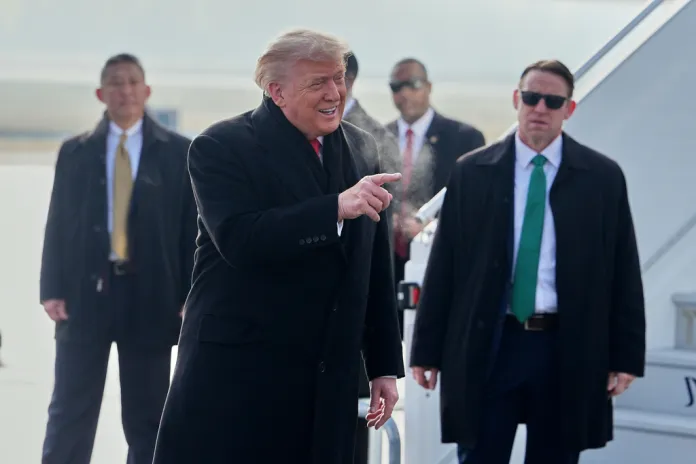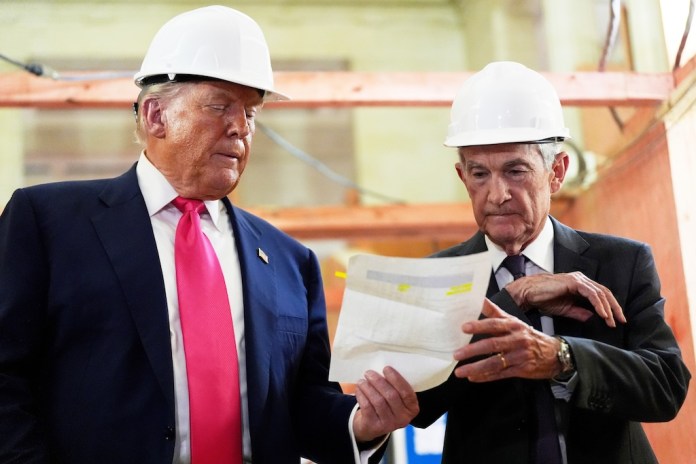It’s Time For Trump To Play Hardball With Qatar
The article outlines President Trump’s ambitious strategy for the Middle East, which aims to integrate Gulf states into the U.S. ecosystem through economic cooperation and foster alliances between Arab nations and Israel while isolating Iran. Central to this vision is Qatar,a wealthy emirate that has historically leveraged its resources to wield substantial influence globally-especially in the U.S.-often aligning itself with radical Islamist agendas under a guise of diplomacy.
The piece details how Qatar has invested heavily in lobbying, media, and educational institutions to sway public opinion and U.S. policy in its favor, spending nearly $100 billion on such initiatives.Despite hosting a important U.S. military base, Qatar also maintains ties with Iran and has funded groups like Hamas, presenting a complex diplomatic front. It highlights Qatar’s ongoing ideological alignment with the Muslim Brotherhood and its role in promoting radical Islam.
While Trump envisions economic engagement as a means to pivot Qatar’s actions, the article questions whether this approach can succeed, suggesting that Qatar’s long-standing duplicity and support for terrorism pose significant barriers. The author admonishes against confusing financial investments with genuine loyalty or ethical governance, urging Trump to leverage his position to demand accountability from Qatar instead of accepting its assistance uncritically.
the author warns that Qatar’s actions and motives may not align with U.S. interests and that a failure to address this could allow harmful ideologies to persist unchecked.
President Trump’s vision for the Middle East is bold: bring Gulf states into the U.S. ecosystem through trade, investments, and partnerships; align Arab nations with Israel; isolate Iran, eliminating its nuclear enrichment capability; shift attention to countering China. He believes Qatar, lured by economic deals, will join the Abraham Accords and normalize ties with Israel — a grand coalition with the capitalist West.
It’s audacious. But is it realistic?
For more than 25 years, Qatar — a tiny Gulf emirate with roughly 300,000 citizens and 12 percent of the world’s natural gas — has used its obscene wealth as a geopolitical weapon to buy global power. The goal? Control the narrative, shape Western discourse, and whitewash its radical Islamist agenda behind a diplomatic mask.
Qatar’s American and Global Influence
This isn’t conjecture. It’s a sophisticated, calculated, and well-funded campaign. As The Free Press exposed in “How Qatar Bought America,” the influence Qatar gained in the U.S. has no modern parallel. Doha, Qatar’s capital, has spent nearly $100 billion propagandizing U.S. institutions — Congress, universities, media organizations, think tanks, and corporations. It has transformed Middle East studies programs into Muslim Brotherhood indoctrination mills, radicalizing students against America, Israel, and Jews.
“Since 2017, Qatar has spent $225 million on lobbying and public relations in the nation’s capital,” The Free Press reported. Additionally, the Free Press found that between 2019 and 2023, the Brookings Institution alone received $6 million from Qatar. Top firms like McDermott, Will & Emery, Avenue Strategies, and Mercury Public Affairs (once led by Trump aide Susie Wiles) help push Qatar’s messaging, influence U.S. policy, and suppress criticism, The Free Press reported.
Qatari dollars are everywhere: K-12 schools, sports, critical infrastructure, energy projects, Hollywood’s Miramax, the Empire State Building, the Plaza, and St. Regis hotels — the list continues. They’ve bought power in both parties. Former New Jersey Democrat Sen. Bob Menendez was recently sentenced to 11 years for accepting bribes from Qatar.
Globally, Qatar plays a double game. It hosts Al Udeid, America’s largest air base in the region, while serving as Iran’s diplomatic and energy partner. It poured more than $1.8 billion into Hamas while posing as a neutral peace broker. In the ’90s, Qatar even sheltered and funded Khalid Sheikh Mohammed — the 9/11 mastermind.
In the fall of 2024, the mother of Qatar’s ruler hailed Hamas leader Yahya Sinwar — the butcher of Oct. 7 — as a martyr and hero and declared that Israel will cease to exist. Qatar’s media arm, Al Jazeera, the global mouthpiece for Islamism, broadcasts anti-American, anti-Israel, and antisemitic propaganda to over 430 million viewers in 150+ countries.
In 2017, Saudi Arabia, the UAE, Bahrain, and Egypt cut ties with Qatar over its terror posture. This is who America’s doing business with.
Qatar Supports Islam and Terrorism
Qatar is hardly moderate. It is ideologically aligned with the Muslim Brotherhood — a transnational Islamist movement bent on establishing Muslim world dominance via a global caliphate under Sharia law. Its strategy is simple: ignite chaos, then offer to fix it — for a price. It wants to appear indispensable to all, but accountable to none.
Trump visited Doha recently and inked headline-grabbing deals: a $1.2 trillion economic pact, a $96 billion Boeing order, and major defense contracts. Qatar even gifted the U.S. a plane to use temporarily as Air Force One. The Trump Organization is planning a luxury golf resort near Doha, partnering with a Qatari company.
The Saudis, for all their flaws, have cracked down on the Brotherhood, opened to Israel, and eased some of their hardline policies. Qatar has done none of that.
In 2017, President Trump noted that the nation of Qatar “has been a funder of terrorism at a very high level.”
Today, Trump believes economic engagement and diplomacy can shift Qatar’s course. He’s using Doha’s soft power playbook — investments and influence — to try turning a dangerous actor into an ally.
But the gamble is enormous. Does Trump truly grasp the scale of Qatar’s duplicity? Accepting their billions of dollars raises an ideological and moral cost.
While Saudi Arabia crawls toward reform, Qatar continues exporting radical Islam — gift-wrapped in skyscrapers and Ivy League grants.
Middle East envoy Steve Witkoff, in an interview with Tucker Carlson, said, “I think you have to trust the Qataris.” Qatar’s leaders are “good, decent people … people who want to do business.”
But what kind of business, and at what price?
Trump Has the Leverage
Trump’s endgame — reducing U.S. military burdens and achieving Arab-Israeli peace — is noble. But can a regime that funds terrorists and indoctrinates our youth in hatred of our values ever align with the free world, the “infidel West?”
Based on the evidence, this would be miraculous indeed.
American presidents must stop mistaking money for loyalty or diplomacy for morality. Hosting U.S. troops doesn’t grant absolution. Economic deals don’t erase terror ties.
If Trump’s visit becomes just a PR win for Doha, the message is damaging: buy enough jets, host enough troops, grease enough palms, and anything is forgiven.
Qatar is not a confused ally. It is a highly sophisticated player with a clear, dangerous agenda. That agenda is not ours.
President Trump has the leverage. He must use it — not to flatter, but to demand accountability. Insist on transparency. Force real change.
If he doesn’t, Qatar’s friendship will remain exactly what it has always been: a polished performance masking something far darker.
Ziva Dahl is a fellow with the Haym Salomon Center. She has a Master of Arts degree in public law and government from Columbia University and an A.B. in political science from Vassar College.
" Conservative News Daily does not always share or support the views and opinions expressed here; they are just those of the writer."


